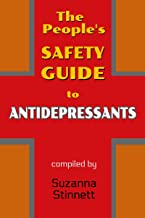Antidepressant Discontinuation Syndrome
Resources for Patients and Caregivers
Typical symptoms of antidepressant discontinuation syndrome include flu-like symptoms, insomnia, nausea, imbalance, sensory disturbances, and hyperarousal. These symptoms usually are mild, last one to two weeks, and are rapidly extinguished with reinstitution of antidepressant medication.
Cluster Number:
Wiki Number: 06-Antidepressant Discontinuation Syndrome
Diagnosis: After a month of antidepressants sudden stops or even tapering off take a week to a year.
US Patients:
World Patients:
Sex Ratio:
Age Onset:
Brain Area: Antidepressants apparently reorganize the neurotransmitters, serotonin, dopamine, etc.
Symptoms: Flu-like, disturbed sleep and/or balance, nausea or sensory changes.
Progression: Occurs in 20-50% of stopping use of antidepressants, especially when stopped immediately.
Causes:
Medications:
Therapies:
Youtube Video: Antidepressant Withdrawal
Amazon or Library Book: The People’s Safety Guide to Antidepressants
Click the book to link or order from Amazon.

